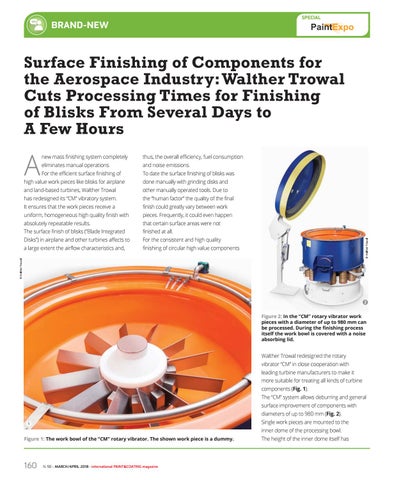SPECIAL
BRAND-NEW
A
new mass finishing system completely
thus, the overall efficiency, fuel consumption
eliminates manual operations.
and noise emissions.
For the efficient surface finishing of
To date the surface finishing of blisks was done manually with grinding disks and
and land-based turbines, Walther Trowal
other manually operated tools. Due to
has redesigned its “CM” vibratory system.
the “human factor” the quality of the final
It ensures that the work pieces receive a
finish could greatly vary between work
uniform, homogeneous high quality finish with
pieces. Frequently, it could even happen
absolutely repeatable results.
that certain surface areas were not
The surface finish of blisks (“Blade Integrated
finished at all.
Disks”) in airplane and other turbines affects to
For the consistent and high quality
a large extent the airflow characteristics and,
finishing of circular high value components
© Walther Trowal
high value work pieces like blisks for airplane
© Walther Trowal
Surface Finishing of Components for the Aerospace Industry: Walther Trowal Cuts Processing Times for Finishing of Blisks From Several Days to A Few Hours
2 1
Figure 2: In the “CM” rotary vibrator work pieces with a diameter of up to 980 mm can be processed. During the finishing process itself the work bowl is covered with a noise absorbing lid.
Walther Trowal redesigned the rotary vibrator “CM” in close cooperation with leading turbine manufacturers to make it more suitable for treating all kinds of turbine components (Fig. 1). The “CM” system allows deburring and general surface improvement of components with diameters of up to 980 mm (Fig. 2). Single work pieces are mounted to the
1
inner dome of the processing bowl.
Figure 1: The work bowl of the “CM” rotary vibrator. The shown work piece is a dummy.
160
N. 50 - MARCH/APRIL 2018 - international PAINT&COATING magazine
The height of the inner dome itself has
